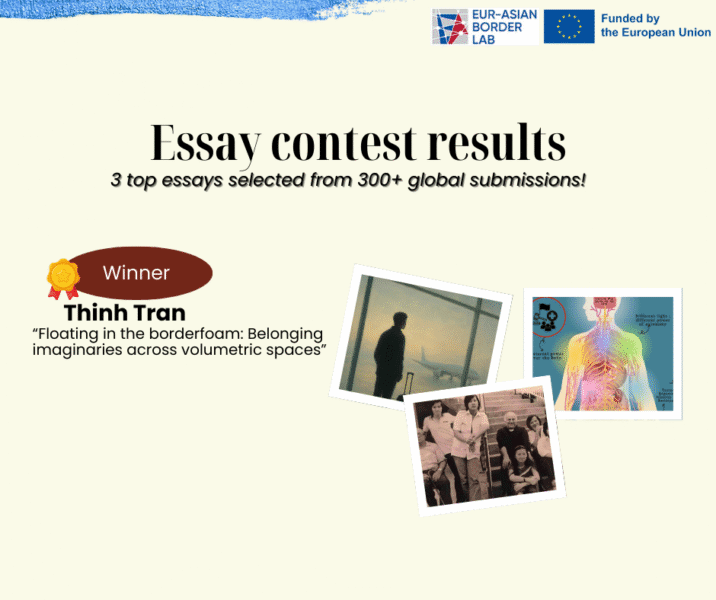
Top 3 essays of the Eur-Asian Border Lab’s 2025 volumetric borders essay contest
Earlier this year, the Eur-Asian Border Lab called for innovative essays on volumetric borders and bordering, challenging contributors to explore the disconnect between traditional territorial politics and the evolving dynamics of multidimensional spaces. From over three hundred global submissions, a blind review process selected three works that combine rigorous scholarship with innovative storytelling.
Following our June announcement of outcome to all participants, these winning essays underwent collaborative editing with the writers and our scholarly team. The results challenge conventional academic writing through multi-layered approaches that mirror the complex, layered nature of contemporary bordering itself.
- Winner
Thinh Tran (Vietnam) – “Floating in the borderfoam: Belonging imaginaries across volumetric spaces”
An independent researcher based in Vietnam, Tran transforms international student mobility into a profound meditation on suspended belonging. Drawing on interdisciplinary and decolonial perspectives, Tran explores how borders operate not just territorially, but atmospherically, in aeroplane cabins, algorithmic systems and, of course, the affective labour of constant cultural translation. Through visual narratives and poetic interludes, this essay reveals how students in motion inhabit what Tran calls “borderfoam,” unstable terrains where belonging is continually assembled through flight paths, visa scores, and the quiet exhaustion of performing gratitude.
- Runners-up
Gwen Petrina Latenri Tappu (Indonesia) – “Bodies, bytes, and borders: Unpacking the volumetric barriers of global healthcare access”
A medical student from Indonesia with interests in neurosurgery and global health, Tappu delivers a searing analysis of how borders operate through bodies, data systems, and geopolitical care regimes. Through powerful ethnographic vignettes – a midwife in rural Papua struggling with failed internet connections, a doctor sending ECGs through WhatsApp – this essay exposes how healthcare access is governed by intersecting biological, digital, and territorial boundaries. Tappu’s work bridges medical practice and border theory, revealing how the promise of telemedicine often reproduces the very inequalities it claims to solve.
Mia Tran (Vietnam/USA) – “Bordering in silence: A volumetric archive of identity”
A writer and activist currently studying International Relations at New York University, Tran crafts an intimate archaeology of inherited borders. Beginning with her father’s 1979 refugee journey across the South China Sea and her mother’s defiance of gender expectations in 1980s Saigon, this essay traces how borders migrate across generations, languages, and therapeutic spaces. Through her curatorial project, “Lặng (Solitude),” and advocacy work with the UN and PAHO, Tran demonstrates how healing occurs through individual resilience as well as collective spaces where vulnerability becomes a form of resistance.
A new form of scholarship
If there is one thing this essay contest revealed, it’s that there is a global hunger for border studies that moves beyond traditional geopolitical analysis toward more embodied, technologically-informed approaches. Participants included medical and legal practitioners, artists, activists, and researchers spanning diverse fields from digital humanities to migration studies.
These three winning essays answer that call, demonstrating that the future of border studies lies in interdisciplinary collaboration and innovative formats. Integrating family photographs with theoretical analysis, clinical ethnography with poetry, and personal narrative with scholarly argument, each offers a distinct lens on how borders operate across contemporary spaces – from suspended student mobility to healthcare system barriers to inherited identity boundaries.